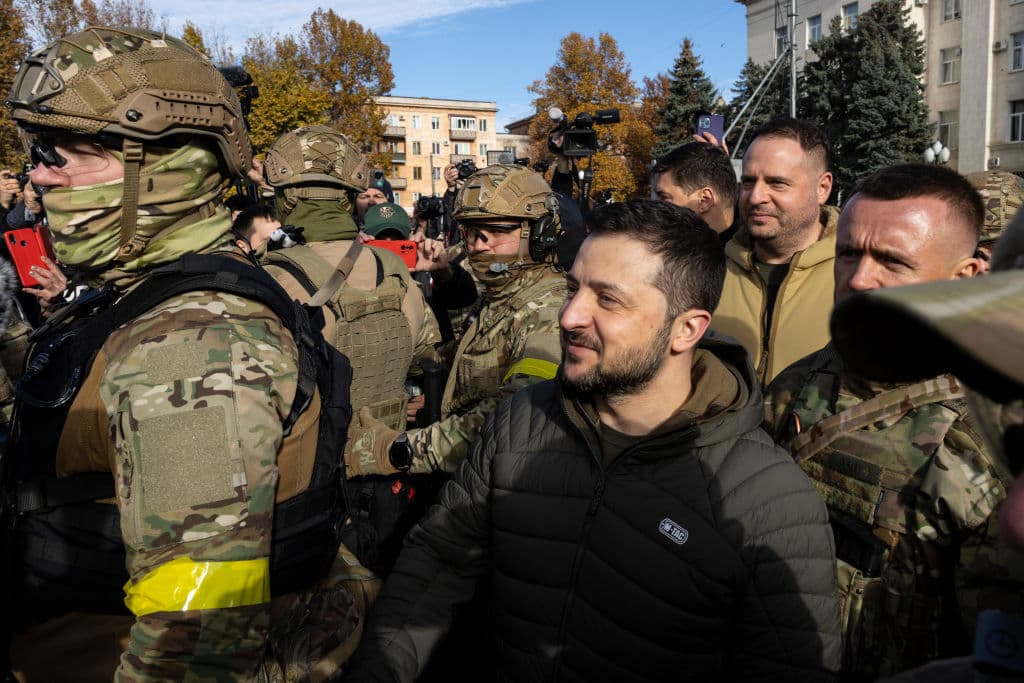Ukraine war latest: Zelensky in liberated Kherson says 'we are ready for peace. A peace for all of Ukraine'

Key developments on Nov. 14:
- Ukraine repels Russian attacks near seven settlements over past day
- Putin signs a decree allowing foreigners to serve in Russian army
- Russia likely to intensify its offensive in Donetsk Oblast, the Institute for Study of War believes
Three days after the liberation of the southern regional capital of Kherson, President Volodymyr Zelensky paid an unannounced visit to the city.
Zelensky said Ukraine is only "interested in de-occupation of our country and territories."
"We are (always) ready for peace. A peace for all of Ukraine," he added.
Earlier, Western media reported that the West might push Kyiv to negotiate with Moscow.
According to the Wall Street Journal, senior U.S. and EU officials are divided on the need to push Ukraine into peace talks. However, they believe an opportunity for negotiations may appear in the coming weeks or months.
"We respect international law and the sovereignty of every state, and now we are talking about the sovereignty of our state. That is why we are fighting against Russian aggression," Zelensky empathized.
"We are not interested in the territory of other countries."
Kyiv denied facing any pressure from the West regarding peace talks. Oleh Nikolenko, Ukraine's Foreign Ministry spokesman, said on Nov. 14 that Russia is not in a position to dictate terms of negotiations.
"Ukraine's peace formula remains unchanged: an immediate end to the war, the withdrawal of all Russian troops, the restoration of Ukrainian territorial integrity, compensation for the damages, and the provision of sufficient guarantees of non-repetition of aggression. Under other conditions, it will be impossible to achieve lasting peace," Nikolenko said.
Meanwhile, U.S. President Joe Biden congratulated Ukraine on the liberation of the southern city of Kherson, saying it was "a significant, significant victory," and stressed that negotiations toward a ceasefire are impossible without Ukraine's participation.
"I've been very clear that we're going to continue to provide the capability for the Ukrainian people to defend themselves – and we are not going to engage in any negotiation. There's nothing about Ukraine without Ukraine, this is a decision Ukraine has to make," Biden said on Nov. 14, as quoted by CNN.
On the same day, Kremlin's spokesman Dmitry Peskov said that talks between Russia and the U.S. took place on Nov. 14 in Ankara, the Russian state-controlled TASS news agency reported.
According to Peskov, the meeting was attended by CIA Chief William Burns and Russian Foreign Intelligence Service Chief Sergey Naryshkin.
Reuters reported citing an unnamed White House official, that Burns planned to caution Naryshkin about the consequences of nuclear weapon use and discuss U.S. prisoners remaining in Russia.
On the battlefield
Russian forces continue to strike Ukrainian positions in Kherson Oblast, according to the General Staff of Ukraine's Armed Forces. The settlements of Mylove, Zolota Balka, Mykhailivka, and Shevchenkivka in Kherson Oblast came under artillery fire, the report said.
According to the Ukrainian military, the number of Russian forces in the occupied towns of Kakhovka, Tavriisk, and Nova Kakhovka, all on the east bank of the Dnipro River, has decreased.
The General Staff also reported on Nov. 14 that Russia had lost 510 troops in the past day, bringing the total number of Russian soldiers killed since the start of the full-scale invasion to 81,370.
To replenish combat losses, Russia had conscripted 318,000 citizens since the beginning of mobilization in September, according to Russian President Vladimir Putin. Some 49,000 of these conscripts are already fighting in Ukraine, he said. After announcing mobilization, Russia has allowed conscripting citizens with convictions for serious crimes.
On Nov. 14, Putin signed a decree that allows foreign citizens to serve in the ranks of Russia's Armed Forces, the state news agency TASS reported.
The military said it had repelled Russian attacks near settlements of Novoselivske, Stelmakhivka, and Bilohorivka in Luhansk Oblast and Bilohorivka, Kurdiumivka, Vodiane, and Mariinka in Donetsk Oblast.
In its evening update, the General Staff of Ukraine's Armed Forces said that Russian forces plan to completely evict the civilian population from the settlements of Kreminna, Sievierodonetsk, and Rubizhne, Luhansk Oblast.
The Institute for the Study of War believes Russia will likely intensify its offensive in Donetsk Oblast.
In its latest assessment, the Institute said that Russian forces would resume the offensive in the region in the next few weeks once additional mobilized Russian troops and forces withdrawn from Kherson arrive.
According to the ISW, Ukrainian forces in Donetsk Oblast "will find themselves hard-pressed," and Ukraine will likely have to redeploy some troops to defend against the offensive operations.
"The Russians are not likely to make operationally significant gains despite their renewed efforts, although they could conceivably take Bakhmut over time at enormous cost," the ISW writes.
The U.S. think tank notes that Russian mobilized troops "have shown themselves inadequately trained, poorly equipped, and very reluctant to fight."
Attacks and casualties
In the southern Kherson Oblast, four people were injured as a result of a car explosion, Deputy Head of the President's Office Kyrylo Tymoshenko reported.
A car hit a landmine in the village of Novoraisk on Nov. 13. According to Tymoshenko, an 11-year-old child was among the injured.
In the past day, the Russian forces injured four civilians in Donetsk Oblast, Governor Pavlo Kyrylenko said.
He said one person was wounded in Kurakhove, one in Bakhmut, one in Andiivka, and one in Ivanivske, adding that it is still impossible to determine the exact number of victims in occupied Mariupol and Volnovakha.
Sumy Oblast came under Russian attacks with 264 mines, missiles, and shells on Nov. 13. Governor Dmytro Zhyvytskyi reported that Russian forces targeted Shalyhyne, Znob-Novhorodske, Khotin, Bilopillia, Yunakivka, and Krasnopillia.









